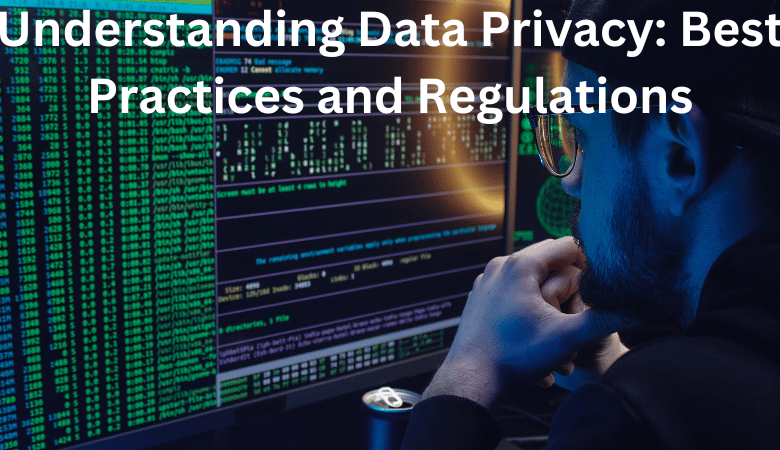Understanding Data Privacy: Best Practices and Regulations

Understanding data privacy best practices and regulations is essential for businesses that collect, use, or disclose personal data. This article provides a overview of data privacy laws in various countries and provides tips for complying with these laws.
1. Introduction
Data privacy is an important issue that has been receiving increased attention in recent years. The concern over data privacy has been heightened by a number of high-profile data breaches, including the Equifax breach that exposed the personal information of over 143 million people.
Data privacy refers to the protection of personal data, which is any information that can be used to identify an individual. This includes things like name, address, date of birth, social security number, and so on.
There are a number of laws and regulations that govern data privacy, including the General Data Protection Regulation (GDPR) in the European Union, the California Consumer Privacy Act (CCPA) in the United States, and the Personal Data Protection Act (PDPA) in Singapore.
companies need to take steps to ensure that they are compliant with these laws and regulations. This includes things like ensuring that personal data is collected and processed in a transparent way, providing individuals with the ability to access and update their personal data, and ensuring that personal data is securely stored.
There are a number of best practices that companies can follow to ensure that they are protecting personal data in a responsible way. These include things like implementing data security measures, ensuring that data is only collected for legitimate purposes, and providing individuals with the ability to opt out of data collection.
By following these best practices, companies can help to ensure that they are protecting personal data in a responsible way and complying with the relevant laws and regulations.
2. What is data privacy?
Data privacy is the relationship between the collection and dissemination of data, technology, the public expectation of privacy, and the legal and political issues surrounding data privacy. Data privacy is an evolving concept in an increasingly data-driven world. It is a complex and multi-faceted issue that raises a number of important questions.
What is data?
Data is any piece of information that can be used to identify an individual. This includes things like names, addresses, phone numbers, email addresses, birthdates, and Social Security numbers. It also includes more sensitive information like medical records, financial records, and fingerprints.
What is privacy?
Privacy is the right of an individual to keep his or her personal information private. This right is not absolute, but it is generally recognized as a fundamental human right.
What is data privacy?
Data privacy is the right of an individual to keep his or her personal data private. This right is not absolute, but it is generally recognized as a fundamental human right.
Why is data privacy important?
Data privacy is important because it helps to protect our personal information from being used without our consent. This can potentially lead to a loss of control over our personal information and how it is used. It can also lead to identity theft, fraud, and other malicious activities.
What are the best practices for data privacy?
The best practices for data privacy vary depending on the type of data being collected and the country in which the data is being collected. However, there are some general best practices that should be followed in all cases.
Some of the general best practices for data privacy include:
– Get consent before collecting, using, or sharing personal data
– Keep data secure and protect it from unauthorized access
– Collect only the data that is necessary and delete it when it is no longer needed
– Be transparent about how data is being used and give individuals the ability to opt-out of data collection
– Respect an individual’s right to data privacy
What are the data privacy regulations?
There are a number of data privacy regulations that have been enacted in recent years. These
3. Best practices for data privacy
Data privacy is a big deal these days. With all the news about data breaches and scandals, it’s no wonder that people are concerned about their privacy.
There are a few things you can do to help protect your privacy. Here are three best practices for data privacy:
1. Be Careful What You Share Online
Be careful about what you share online. Don’t post anything that you wouldn’t want the world to see. That includes personal information like your address, phone number, and date of birth.
2. Use a VPN
A VPN (virtual private network) can help protect your privacy by encrypting your traffic. That means your ISP (internet service provider) and anyone else snooping on your traffic won’t be able to see what you’re doing online.
3. Use Two-Factor Authentication
Two-factor authentication is an extra layer of security that requires you to enter a code from your phone in addition to your password. This makes it much harder for someone to hack into your account.
These are just a few of the best practices for data privacy. For more tips, check out our complete guide to online privacy.
4. Data privacy regulations
Data privacy is a major concern these days. With so much information being shared online, it’s important to make sure that your data is protected. There are a number of regulations in place to help ensure that your data is safe and secure. Here are four of the most important data privacy regulations:
1. The General Data Protection Regulation (GDPR)
The GDPR is a regulation in the European Union that became effective in May of 2018. It strengthens and builds on the EU’s current data protection framework, the General Data Protection Regulation (GDPR). The GDPR sets out strict rules about how personal data must be collected, used, and protected. It gives individuals the right to know what personal data is being collected about them, the right to have that data erased, and the right to object to its use.
2. The California Consumer Privacy Act (CCPA)
The CCPA is a state law in California that went into effect in January of 2020. It gives California residents the right to know what personal data is being collected about them, the right to have that data deleted, and the right to opt out of its sale. The CCPA applies to companies that do business in California and meet certain criteria, such as having annual revenues over $25 million or collecting personal data on more than 50,000 consumers.
3. The Children’s Online Privacy Protection Act (COPPA)
COPPA is a federal law that went into effect in April of 2000. It prohibits companies from collecting personal data from children under the age of 13 without their parents’ consent. COPPA applies to companies that operate websites or online services that are directed at children or that have actual knowledge that they are collecting personal data from children.
4. The Gramm-Leach-Bliley Act (GLBA)
The GLBA is a federal law that went into effect in November of 1999. It requires financial institutions to disclose their information-sharing practices to customers and to take steps to protect the confidentiality of customer information. The GLBA applies to banks, credit unions, securities firms, and other financial institutions.
These are just four of the many data privacy regulations that are
5. Conclusion
As we have seen, data privacy is a complex and ever-evolving issue. There are a number of best practices and regulations that organizations should be aware of when handling personal data.
Organizations should first and foremost ensure that they have a clear and concise data privacy policy in place. This policy should outline how personal data is collected, used, and protected. It should also explain an individual’s rights with respect to their personal data.
Organizations should also take steps to ensure that only the minimum amount of personal data is collected and that it is only used for the purposes for which it was collected. Personal data should be kept secure and only shared with those who need to have access to it.
Finally, organizations should stay up-to-date on data privacy laws and regulations. These laws and regulations are constantly changing and it is important for organizations to be compliant.
Data privacy is a complex issue, but by following these best practices, organizations can help protect the personal data of their employees, customers, and other individuals.




